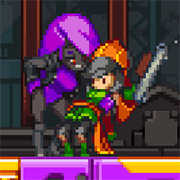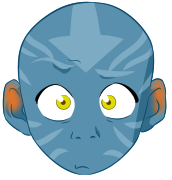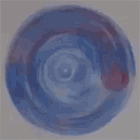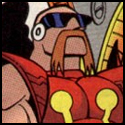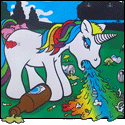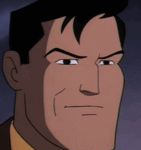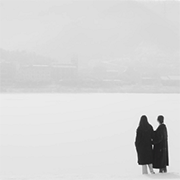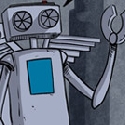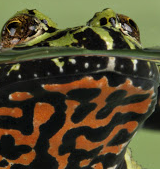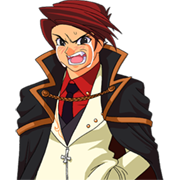|
dog days are over posted:Looking at this I think one of the reasons I have a preference for 2D animation is that they look like moving storybook illustrations, and that that stirs up sentimentality and nostalgia for me. 3D doesn't do that because that visual style was just never a part of my childhood until Toy Story, and I think I was 11 by then. When I was young I was obsessed with computer animation, so that probably has alot to do with me liking it so much. I remember being taking to some science museum that had an exhibit on it and I think they had the original Pixar Luxo short and a bunch of other stuff and I just loved the way it all looked. Then later, I saw a thing on how they made the cave of wonders in Aladdin and I when I saw that I just loved the way that looked. Eventually cgi became extremely common and I got used to it but I've always had a fondness for it. This is also probably why I'm much more tolerant of crappy effects than most people seem to be.
|
|
|
|

|
| # ? Jun 9, 2024 05:24 |
|
Macaluso posted:It's a pity about the... rest of... YOUR movie. Bitch. It's a movie about the gap between Disney logic and real life logic, which begins with a sequence that can easily be read as parody but slowly loses its edge and turns into a story about how Disney logic is better. I guess some people might find that comforting but it grosses me out. It's just so self-congratulatory and dismissive.
|
|
|
|
Macaluso posted:It's a pity about the... rest of... YOUR movie. Bitch. Your face. It's a pity about the rest of your face. Always go for the face. Some people head straight for the "your mom" joke, but that can lead to awkwardness if she turns out to be dead.
|
|
|
|
Tuxedo Catfish posted:It's a movie about the gap between Disney logic and real life logic, which begins with a sequence that can easily be read as parody but slowly loses its edge and turns into a story about how Disney logic is better. I guess some people might find that comforting but it grosses me out. It's just so self-congratulatory and dismissive. This is the subtext of Frozen, Wreck-It Ralph (basically an unofficial remake of Shrek), Brave, and The Princess and the Frog as well.
|
|
|
|
K. Waste posted:Wreck-It Ralph (basically an unofficial remake of Shrek) You lost me.
|
|
|
|
Wreck-it Ralph really has nothing thematically in common with Shrek. Shrek lands its theme pretty well, that assigned narratives are toxic because it encourages lazy thinking about others. Ralph "wins" when he accepts his assigned narrative.
|
|
|
|
Tuxedo Catfish posted:It's a movie about the gap between Disney logic and real life logic, which begins with a sequence that can easily be read as parody but slowly loses its edge and turns into a story about how Disney logic is better. I guess some people might find that comforting but it grosses me out. It's just so self-congratulatory and dismissive. It worked at the outset, when it was a movie about how Disney movies are condensed and simplified, and that's not wrong--they're supposed to inspire and not model real life. But then it loses faith in its audience and chickens out and eh dragon fight.
|
|
|
|
Waffleman_ posted:You lost me. Pick posted:Shrek lands its theme pretty well, that assigned narratives are toxic because it encourages lazy thinking about others. Ralph "wins" when he accepts his assigned narrative. Exactly. Wreck-It Ralph is basically Shrek from the perspective of Lord Farquaad. Remember that Lord Farquaad, with his monomaniacal need to control the narrative of the world around him and banish those figures who violate their assigned roles, ostensibly represents Disney. Wreck-It Ralph features a much more diverse and accurate parody of Disney industrial formulas: There is not one Magic Kingdom (Dulac), but multiple 'rides' with their own individualized, market-tested niches, and characters who literally work in 9-to-5 shifts. Ralph is very much like Shrek in that he's a 'bad guy who isn't a bad guy.' Their individual motives are different, to be sure (Shrek wants his swamp to himself, Ralph wants to get to come up to the big house), but they're overtly similar in that, while basically selfish and representing their assigned villain roles quite well, they both have 'layers' of vulnerability and self-doubt that betray their basic need for compassion and approval. The reason this character trait doesn't seem as pronounced in Shrek is because it's a more dramatically complex film (waiting well into the second act before Shrek even reveals that he actually cares what people think of him), but also because Wreck-It Ralph's setting and web of characters is more complex: This is what the world would look like if Shrek, the Big Bad Wolf, and the witches hung out occasionally and Lord Farquaad chummed it up with the pigs and Little Red Cap. In one sense, this makes the segregation and oppressive paradigms of Wreck-It Ralph even more pernicious and toxic than as they are depicted in Shrek, where these same corporate paradigms are simplified to make them an easy target of satire. But then comes in Pick's accurate assessment of the films' respective thematic conclusions. Wreck-It Ralph treats villainy explicitly as a role where one pretends motivation - Ralph isn't actually mad that urban development has destroyed his home, he just wants to be friends. With Shrek, on the other hand, the 'role' he plays of the big, stupid, ugly ogre is in direct response to the very real threat of violence and aggression that he faces as the result of intolerance. Wreck-It Ralph isn't really a story about a 'bad guy,' while part of the fun of Shrek is being able to see a bad guy doing bad things and having fun while doing it. Wreck-It Ralph is what Farquaad/Disney really wants, which is for those who rebel against its toxic or regressive paradigms to be pacified by token gestures to their importance to maintaining the system. The response of Shrek to this is, "gently caress you, you're not fooling anybody."
|
|
|
|
Tuxedo Catfish posted:It's a movie about the gap between Disney logic and real life logic, which begins with a sequence that can easily be read as parody but slowly loses its edge and turns into a story about how Disney logic is better. I guess some people might find that comforting but it grosses me out. It's just so self-congratulatory and dismissive. I like the love story between Giselle and Robert, I think it's cute. And I like that i pokes fun at the Disney things while also embracing them. The only thing I didn't like was when Pip poops. What was even the point of that. Of course I love the Disney logic (and well Disney in general) and love happy endings so. I'm sure that helps too. I love the scene where Giselle is yelling at Robert at how he always says "no" and it's like awww she so totally loves that guy at that moment
|
|
|
|
K. Waste and Pick---That's very astute! Thank you. I wouldn't necessarily have thought to compare Shrek and Ralph in that way, but that makes perfect sense. At the time, I chose to interpret Wreck-it-Ralph in a positive sense, that we're all dealt certain cards in life, and that even if we can't change or discard them, we can choose how we play them. We can also choose to unthinkingly swallow what other people tell us about us, or we can choose to define ourselves, for ourselves. But, you're right that there's a potential dark side to or dark interpretation of Wreck-It-Ralph's message, which is that the class or social niche you're born into is the one you ultimately deserve, so you might as well put on a happy face and make do. It occurs to me that there's an additional message there that if you dare to upset the status quo, it might result in you and/or people you care about being "unplugged." Viewed through this lens, the film becomes quite creepy, actually! Hmmm!
|
|
|
|
I think WIR is a good and enjoyable film, I just disagree that it's similar to Shrek.
|
|
|
|
There's probably a more precise extra-textual interpretation of Wreck-It Ralph in that his origins are very similar to the Lorax.
|
|
|
|
I really like 3D-computer animation. I wish there was more of it. I just wish that it weren't seen as an upgrade to 2D-drawn animation, because it's not; it's a sidegrade. 2D-drawn animation doesn't deserve the "use occasionally for artistic or historical purposes" treatment that silent or black-and-white films have gotten, because 3D-computer animation did not obsolete it; it merely presented an alternative. You can certainly use 3D-computer animation to make much more true-to-life animation than 2D-drawn animation, but if your intent from the beginning is to be stylized, as it is in pretty much all family or "cartoon" animated films, this should not be a concern in the least - and, in fact, the desire to be true-to-life often simply produces uglier characters. BIBLIOGRAPHY Bee Movie, 2003, Adam Sandler
|
|
|
|
Y''know Wreck it Ralph is a lot like Bee movie, they both have characters that pervert the natural order for their own gain.
|
|
|
|
Is Wreck it Ralph communist propaganda, is that what you guys are telling me
|
|
|
|
I can't believe this diss on Wreck-It Ralph. It's a totally awesome movie.
|
|
|
|
Shrek and Wreck it Ralph are not very similar. It's not clear that Ralph actually lost his stump, I don't think. Wasn't the game's story a kind of play the characters performed? Shrek is upset that the kingdom comes in and disrupts the pleasant little life he's built for himself. Ralph is upset because he's socially isolated and looked down upon for no good reason. This is how their stories start. Of course Ralph's resolution comes from making friends and becoming accepted. It's also weird to say that the moral of Wreck it Ralph is to accept your prescribed social role. Ralph accepts an authority figure's orders and plays the monster exactly once; it's when he smashes up Vanellope's car. The results are disastrous. It's when he accepts himself and his values that he is able to work for what he wants and change his own life. I agree that there are limits to that message. Some people are just in lovely positions that self-acceptance will do absolutely nothing about. The fact that Ralph's dump being renovated into a great, comfortable place at the end, however, shows that Ralph was never in such a situation.
|
|
|
|
With the discussion of WIR and its conclusions about roles, I have to confess I've always struggled to take much positive out of Nightmare Before Christmas. I love that movie to bits, not least of all because I love Elfman's singing, but is there a way to interpret the movie besides "don't do anything new, you'll just gently caress it up horribly."
|
|
|
|
Boxman posted:With the discussion of WIR and its conclusions about roles, I have to confess I've always struggled to take much positive out of Nightmare Before Christmas. I love that movie to bits, not least of all because I love Elfman's singing, but is there a way to interpret the movie besides "don't do anything new, you'll just gently caress it up horribly." I always got the impression the moral was more "don't neglect what you already have chasing after something new", with maybe a side of "envy bad" (Santa's telling him off at the end was "don't steal someone else's holiday"). The lyrics to "Poor Jack" have him rather glad overall he tried something new ("at least I gave them stories they can tell!") and re-vitalized for his own job. The fact it ends with Jack finally going for the love interest who was "there all along" kinda seals that idea for me.
|
|
|
|
Pick posted:Wreck-it Ralph really has nothing thematically in common with Shrek. Yeah, if you want to assign a label to Wreck-It Ralph, I would call it the "anti-Megamind." Tartarus Sauce posted:K. Waste and Pick---That's very astute! Thank you. I wouldn't necessarily have thought to compare Shrek and Ralph in that way, but that makes perfect sense. This is pretty much the message I took away from it, that when you're born into poo poo then other people get to treat you like poo poo, and gently caress you if you try to change things because why aren't you thinking of the people that are objectively better than you? Haven't you thought about what they want and need (to treat you like poo poo)? I mean, I like the movie and it's enjoyable on a narrative level, but boy does it have a hosed up message. MadDogMike posted:I always got the impression the moral was more "don't neglect what you already have chasing after something new", with maybe a side of "envy bad" (Santa's telling him off at the end was "don't steal someone else's holiday"). The lyrics to "Poor Jack" have him rather glad overall he tried something new ("at least I gave them stories they can tell!") and re-vitalized for his own job. The fact it ends with Jack finally going for the love interest who was "there all along" kinda seals that idea for me. Me too, I've always gotten a "grass is greener on the other side" vibe from Nightmare before Christmas. Jack already has it pretty good, as opposed to Ralph who is literally forced to live in garbage because That Is His Place. raditts fucked around with this message at 14:15 on Dec 30, 2014 |
|
|
|
dog days are over posted:Looking at this I think one of the reasons I have a preference for 2D animation is that they look like moving storybook illustrations, and that that stirs up sentimentality and nostalgia for me. 3D doesn't do that because that visual style was just never a part of my childhood until Toy Story, and I think I was 11 by then. To be fair, Ernest & Celestine looks like a storybook because it comes from a series of childrens books that most French kids in the eighties have read :  For me it was a double helping of nostalgia.
|
|
|
|
LaughMyselfTo posted:I really like 3D-computer animation. I wish there was more of it. I just wish that it weren't seen as an upgrade to 2D-drawn animation, because it's not; it's a sidegrade. 2D-drawn animation doesn't deserve the "use occasionally for artistic or historical purposes" treatment that silent or black-and-white films have gotten, because 3D-computer animation did not obsolete it; it merely presented an alternative. You can certainly use 3D-computer animation to make much more true-to-life animation than 2D-drawn animation, but if your intent from the beginning is to be stylized, as it is in pretty much all family or "cartoon" animated films, this should not be a concern in the least - and, in fact, the desire to be true-to-life often simply produces uglier characters. The reason there's not more is due to economic and not cultural reasons. Your low-grade productions will always use the cheapest method available and for the past 15 years or so that's been 3D animation. That's not going to change, and the best you can do is simply forget that anything but the best stuff actually exists (which is pretty easy because that's what people do). I know someone will bring up Princess and the Frog's failures but honestly that film did absolutely nothing interesting with 2D animation.
|
|
|
|
Wittgen posted:Shrek and Wreck it Ralph are not very similar. It's not clear that Ralph actually lost his stump, I don't think. Wasn't the game's story a kind of play the characters performed? Shrek is upset that the kingdom comes in and disrupts the pleasant little life he's built for himself. Ralph is upset because he's socially isolated and looked down upon for no good reason. This is how their stories start. Of course Ralph's resolution comes from making friends and becoming accepted. When Ralph is narrating the story of his life, he seems to take the narrative of his stump being taken away quite literally. Furthermore, it's not really pertinent if at some point in the retro-past he really did have an urban renewal program destroy his home. The point is that now he lives in a slum, and now he has to live the narrative of his home being destroyed and being thrown to his failure King Kong-style over-and-over again, and that every night he goes back to sleep under bricks. Yes, the games are just artifice, a 'play' that all the characters buy into, but the plays are metaphors for very real social realities that the video game characters experience, in the same way that Farquaad of Shrek's idea of a perfect world is literally a theme park, but this theme park is just a 'front' for ghetto-ization and racial violence. quote:It's also weird to say that the moral of Wreck it Ralph is to accept your prescribed social role. Ralph accepts an authority figure's orders and plays the monster exactly once; it's when he smashes up Vanellope's car. The results are disastrous. It's when he accepts himself and his values that he is able to work for what he wants and change his own life. I agree that there are limits to that message. Some people are just in lovely positions that self-acceptance will do absolutely nothing about. The fact that Ralph's dump being renovated into a great, comfortable place at the end, however, shows that Ralph was never in such a situation. This is kind of an over-simplification. Remember that the character who orders Ralph to smash Vanellope's car under the pretense that doing this will 'save her' is King Candy, the alter-ego of Turbo, the first character to defy their programming and leave their game. In the context of the film, Ralph's ultimately 'truly villainous' act comes at the behest of a figure who Ralph is in danger of becoming in the blind pursuit of his own selfish desire for absolution as 'a winner.' Yeah, Turbo is explicitly evil as opposed to Ralph's bungling ignorance, but the endgame is just the same: If Ralph stays away from his game too long, everyone else is out of the job and the town is decommissioned. In the quasi-Who Framed Roger Rabbit?/videogame symbolism of the film, this act is truly villainous not because Ralph has 'accepted an authority figure's orders,' but because that authority figure is a very typical Disney archetype of a 'false King,' one who has 'hacked' his way to where he is in defiance of the natural order and therefore represents a threat to the sanitized, segregated order of the games. Even Vanellope's entire predicament is shown to be the result of a character who was once like Ralph - discontent with the repressive and restrictive order that he was forced to experience every day - rigging the system so that the conventional authority figure for once became the outcast. That this change is virtually unrecognizable to the rest of the video game characters, pointing up the inherent hypocrisy within their system, is overwritten by having King Candy literally re-write their memories so that, in effect, it's like nothing has changed. When Ralph and Vanellope defeat King Candy, it's the clandestine realization of Ralph taking orders from the 'true' authority that restores the conventional order of the video games, with the only change being that they now, like, don't routinely stop villains to search them for illegal cherries. But this hasn't actually corrected the regressive paradigms of intolerance and social discrimination that these games and their staged morality plays reinforce on the scale of the children playing them. Ralph now being treated nicely by the same figures who along time ago used an explicitly false narrative (as in, everybody sort of recognized that it was fake) to justify their discrimination against him, is effectively like resolving a story about a teacher who doesn't ever call on one of his/her students, disciplines them more and more harshly than the other students, and privately tells them that they're too dumb to achieve their dreams; by having the teacher not be fired and the two making up at the end through the student's token gesture of appeasement. But this is stuff that historically has actually happened. Like, the teacher in Spike Lee's Malcolm X doesn't think he's being cruel; he thinks he's telling Malcolm what he needs to know in order to 'find his place and be happy.' He's being nice. The problem is that nice-ness doesn't fix the problem of oppression, that just because a system is 'nice' doesn't mean it isn't also evil and taking away someone's basic dignity. Song of the South isn't a better movie because its broad stereotype of Uncle Remus is portrayed as being loved by the white children. Vanellope deciding she wants to be the 'president' rather than the 'princess' hasn't substantively changed anything, it's just another token gesture of formality so that everyone goes back to business as usual.
|
|
|
|
computer parts posted:I know someone will bring up Princess and the Frog's failures but honestly that film did absolutely nothing interesting with 2D animation. The sequence for 'Almost There' and the crazy colors at 'I hope you're satisfied!' in 'Friends on the Other Side' are both pretty interesting, but other than that I have to agree.
|
|
|
|
Boxman posted:With the discussion of WIR and its conclusions about roles, I have to confess I've always struggled to take much positive out of Nightmare Before Christmas. I love that movie to bits, not least of all because I love Elfman's singing, but is there a way to interpret the movie besides "don't do anything new, you'll just gently caress it up horribly." I actually started thinking about this last night after writing my above post, because as a child, I found the moral of Nightmare Before Christmas to be incredibly confusing. So, he was bored with being the King of Halloween, and then he does Christmas, and feels bad about how that goes, and that magically makes him excited about doing Halloween again? What? If I get genuinely bored with something, loving up something else won't suddenly renew my interest in that other thing. I have a different perspective on it as an adult, but that one piece of it still doesn't quite "click" for me, still. Tartarus Sauce fucked around with this message at 19:15 on Dec 30, 2014 |
|
|
|
The thing that redeems Nightmare Before Christmas is that the reason Jack "fucks up" is totally in the eye of the beholder. If you accept that as a living skeleton who heralds the one holiday when evil spirits and ghosts terrify people and children dress as them to coerce candy at of old people, that Jack, while being an absurd hero, is quite explicitly also a diabolical villain, then he never fails at all. This is the part that both Wreck-It Ralph and Shrek neglect by not having protagonists who are almost literally sociopaths. The Nightmare Before Christmas is about a truly villainous person doing truly villainous things, but the spectator coming to sympathize with this, not because they are 'good,' but because the film reminds us that evil feels good sometimes. Every time I watch Nightmare, I'm always struck by just how light and naive the movie is. None of its dramatic conflicts feel tense or real to me, and I have to think this was intentional and informs upon the film's continued popularity among self-styled goths and emos. This is the kind of children's movie that a sociopath would make, in that it's not really about being emotionally invested in what goes on at all, but in being entranced by the diabolical spectacle as it happens. This is what a sociopathic child feels like when they're hanging a cat. Really, Jack is victorious because he's never not a villain doing villainous things. Indeed, it's only through the perpetuation of the diabolical that innocence is possible. The ambiguity of the film is very much like that of Night on Bald Mountain.
|
|
|
|
Eh, Wreck-It Ralph doesn't have Ralph as being really good at evil but he is a character that is very good at wrecking things. Like how Jack can't help but terrify, Ralph can't help but destroy everything he touches. In both films the main characters realize that they were where they belong and can be happy by trying something else and finding that they naturally just were the same way and there's nothing wrong with being that way.
|
|
|
|
The key difference being that Halloween Town is a self-sufficient society that isn't explicitly oppressed by the other holidays. Everyone is treated equally from the beginning and the different groups even have their own respected autonomy. Santa isn't even mad when the 'evil' people do evil things; he ironically reciprocates by making it snow. Both groups come to respect one another implicitly despite any past wrongdoings. The Nightmare Before Christmas is a really good movie about good and evil. On a completely unrelated note, Escape from Planet Earth is a really, really dull movie.
|
|
|
|
I never saw the actions of Jack in Nightmare Before Christmas as being particularly villainous, but more out of cultural misunderstanding. Halloweentown is never portrayed as being evil or bad, but rather treats violence and death with the same joyful acceptance as you'd find in the Addams Family. This even communicates to the part where Santa is kidnapped, as it feels like more of an accepted form of greeting rather than a malicious attack. It fits in with other Burton films such as Edward Scissorhands where the protagonist is not actually evil, but perceived that way when seen through the filter of a more "normal" crowd. The result of the Christmas rampage is more or less a ramping up of "What if you asked a native Indian to make your Thanksgiving dinner?" Without the right cultural perspective and traditions in place, they would understand the generalities but their own culture and experiences would interfere with the final product, and whether or not you enjoy it depends on your understanding of the other's culture and how closely it aligns with your own. (That isn't a whole "you don't get it" argument, but more that the people of the town don't get it) Both NIghtmare and Wreck-It play out like mid-life crises. They come to realize they are unsatisfied with their current lot in life and don't want to end up having regrets with a life where they simply filled a specific role. They aren't happy at the end going back to their old life because it's easier. They always did enjoy the old life. It was the fear that that life would be their only achievement that irked them.
|
|
|
|
dirksteadfast posted:I never saw the actions of Jack in Nightmare Before Christmas as being particularly villainous, but more out of cultural misunderstanding. Halloweentown is never portrayed as being evil or bad, but rather treats violence and death with the same joyful acceptance as you'd find in the Addams Family. This even communicates to the part where Santa is kidnapped, as it feels like more of an accepted form of greeting rather than a malicious attack. It fits in with other Burton films such as Edward Scissorhands where the protagonist is not actually evil, but perceived that way when seen through the filter of a more "normal" crowd. This is part of what I like so much about the movie. I mean... Jack has Santa kidnapped, and when he decides he wants to be "Sandy Claws" for a day, the chaos that it causes in the world is so great that the army loving scrambles the jets to stop him. The point is that from one perspective, Jack's actions are explicitly villainous, but the film teaches us to see this differently because it uses holidays to point up how good and evil are cultural constructs in and of themselves. Jack is a villain to us, but from his perspective, that's just his culture and his values, which he's sharing with us. This is much less a Burton thing than a Selick thing. Burton's schtick with Edward Scissorhands is of a character who, despite his persistent acts of compliance and good, cannot be accepted by 'straight' society because his 'queer' identity poses an implicit danger to its conventional order. Selick's interest is with the 'queer' aspects of 'straight' culture, the way we use queer or diabolical or villainous iconography and traditions to mitigate and provide catharsis for aspects of the human experience that the straight or innocent or good can't resolve. (You see this also in James and the Giant Peace and Coraline.)
|
|
|
|
TNBC is a treasure. And I see it about moving out of your comfort zone and shaking things up without losing yourself in the process.
|
|
|
|
K. Waste posted:This is part of what I like so much about the movie. I mean... Jack has Santa kidnapped, and when he decides he wants to be "Sandy Claws" for a day, the chaos that it causes in the world is so great that the army loving scrambles the jets to stop him. The point is that from one perspective, Jack's actions are explicitly villainous, but the film teaches us to see this differently because it uses holidays to point up how good and evil are cultural constructs in and of themselves. Jack is a villain to us, but from his perspective, that's just his culture and his values, which he's sharing with us. This is much less a Burton thing than a Selick thing. Burton's schtick with Edward Scissorhands is of a character who, despite his persistent acts of compliance and good, cannot be accepted by 'straight' society because his 'queer' identity poses an implicit danger to its conventional order. Selick's interest is with the 'queer' aspects of 'straight' culture, the way we use queer or diabolical or villainous iconography and traditions to mitigate and provide catharsis for aspects of the human experience that the straight or innocent or good can't resolve. (You see this also in James and the Giant Peach and Coraline.) Interesting! This might also explain why people who loved Nightmare Before Christmas and Coraline often felt let down by Corpse Bride, because they felt the resolution there was too "vanilla."
|
|
|
|
I like the resolution to Corpse Bride. Emily moves on without having gotten married; that's not what was holding her back. She refuses to let her desires put someone else in the same position she had been suffering. It's a "softer" ending but it has sophistication.
|
|
|
|
Unfortunately I haven't had the pleasure of seeing the corpse bride, however the music that I've heard from it is pretty good.
|
|
|
|
K. Waste posted:Unfortunately I haven't had the pleasure of seeing the corpse bride, however the music that I've heard from it is pretty good. Just watch this and skip the movie itself. The other songs aren't even that good. https://www.youtube.com/watch?v=j4p9WKnDQzQ
|
|
|
|
Mechafunkzilla posted:Just watch this and skip the movie itself. The other songs aren't even that good. Man, the animation and designs in that movie are so good but the directing just doesn't reach that same level and the script is kinda mellow too. Even that song, which is supposedly a highlight, doesn't have all that much interesting choreography or camera work, hell they have an extended sequence in a black space which screams "we couldn't think of what to put here so have some random animations" to me. It's not a bad movie, just depressingly average.
|
|
|
|
raditts posted:This is pretty much the message I took away from it, that when you're born into poo poo then other people get to treat you like poo poo, and gently caress you if you try to change things because why aren't you thinking of the people that are objectively better than you? Haven't you thought about what they want and need (to treat you like poo poo)? The message is only "hosed up" if you look at it from the perspecive of roles and lots in life having a value judgement attached to them, which the film takes great pains to stress is an arbitrary value determined by society. The world of the Arcade in Wreck it Ralph is paralelled in the real one in that everyone has a "role" to play in their game, hero villain, side character for the entertainment of other people. They don't get any say in their role, it's true, but there is a wider world in which they interact with each other beyond their games, where they can just be themselves. Ralph's folly is that, after all of his years of marginalization and abuse, he has come to internalize the logic thatr his game plays by: Felix and the Nicelanders are "good guys" and deserve good things, while Ralph is a "bad guy" and deserves the garbage. The entire point of the Bad-Anon scene is to get him to stop internalizing that crap and just see his "bad guy" role as just that- a role, that doesn't mean anything at all about him personally. But he doesn't listen, instead coveting the trappings of the "good guy" role (which the actions of the "good guys" in the story tell us is also just a role not indicative of actual goodness) and kicks the whole plot off. Heck, it's all very Christian when you look at it: Wreck it Ralph is a morality play about an abused individual who, thinking he has no other option, falls under the sway of Mammon, in the guise of the Hero's Medal. Ralph's problem- his "sin," if you will- is not wanting to improve his lot in life, it's thinking that a big shiny medal, the trappings of a hero, will liberate him from his self pity and shame and cause everyone to treat him better. Instead, his shallow self gratification becomes a millstone around his neck, poisoning his relationship with the only true friend he's ever had with doubt, and nearly bringing ruin to everybody.( The whole dichotomy between the "false" hero's medal and the "true" medal made by Vanellope is... not very subtle) The Hero's medal, then, is a representation of the Internalization of the "good guy"-"bad guy" dynamic, the lie that caused the Nicelanders to turn on Ralph in the first place, that there is any such thing as a lesser position in a society. And it is only after Ralph rejects this lie (literally, throwing it at the screen) that his redemption through compassion and community can begin. So really, the message of WIR to me is very positive, in that it takes a hammer to the Just World Fallacy and emphasizes that while we will never be truly equal, we can still create a beloved community by showing compassion to one another.
|
|
|
|
I remember a lot of people when WIR came out basically saying that Ralph was entitled and undeserving of any respect / should have stayed in his place. The number of people who completely missed the point of the movie was alarming
|
|
|
|
And, yet, Ralph's pursuit of "shallow self gratification" is ultimately the only thing that teaches the assholes who treat him like poo poo the profound lesson in... not treating him like poo poo. And it's not just the Nicelanders that treat him like that - whether it's the Bad-Anon meeting or Ralph being stopped at the in-between game check points while 'good' characters get to waltz on by without being profiled, the entire society of the arcade is predicated on the strict enforcement of the paradigm that the role you play determines your rights and privileges within the community even when nobody is actually playing your game. Ralph is driven to his pursuit of an artificial signifier of legitimacy because within his society it is the only signifier of legitimacy. There is no 'real' for Ralph or anybody else to compare it to. That Bad-Anon scene, if it's intended as an example of a place where Ralph can legitimately attain some kind of feeling of self-worth despite the regular oppression, neglect, and profiling people in his line of work face, is totally weak. Ralph's defiant act is the only thing that shocks his world from its complacency long enough for him to get a small modicum of decent treatment. He did not think that a Hero's Medal was the only way out of his situation because 'he didn't listen'; he thought this because that's the way it actually was, because in his world there is no difference between your role in the game and your social status. The apologetic, effacing nature with which the film handles Ralph's smashing of the glass ceiling is gross. It's not like Ralph is going and beating up a guy and snatching his idol. He's playing the game just like everybody else and evening the playing field. But this is presented by the film as an option that is simultaneously non-viable to his own game but also nonetheless totally necessary in order to fix the game that nobody even knew was broken because they were so consumed in their paradigmatic prejudices. And these paradigmatic prejudices don't go away even once the Nicelanders decide, "Oh, sorry we were such racists before, here, have some cake while you're lying in the mud"; it's just that Ralph has been assimilated into it. They still keep up the pretenses because it makes them money, even though the entire dramatic twist of the film is that these same pretenses disguise massive internal corruption.
|
|
|
|

|
| # ? Jun 9, 2024 05:24 |
|
TNBC was a warning against making "improvements" to things you have no fundamental understanding of. Jack is Disney corporate and Santa is Disney animation. 
|
|
|


